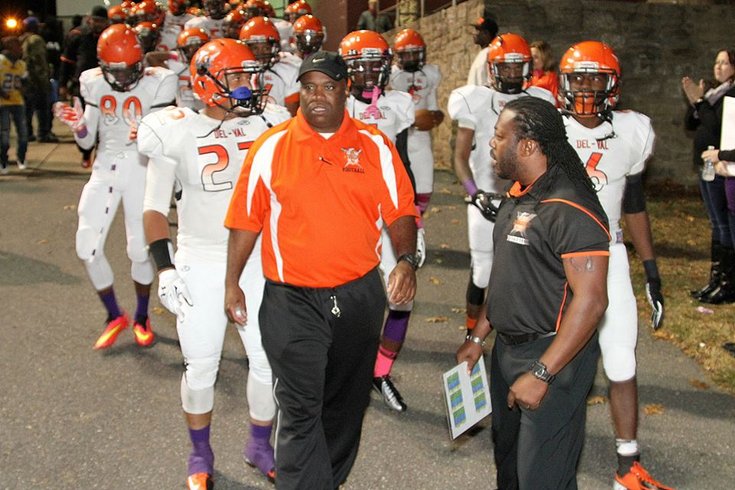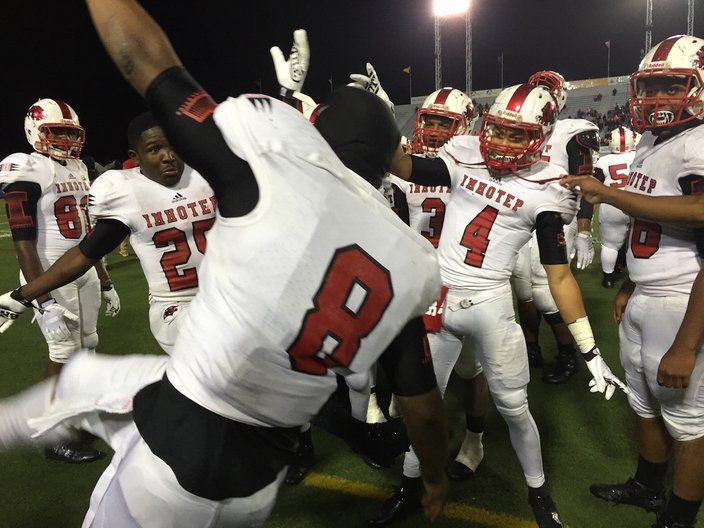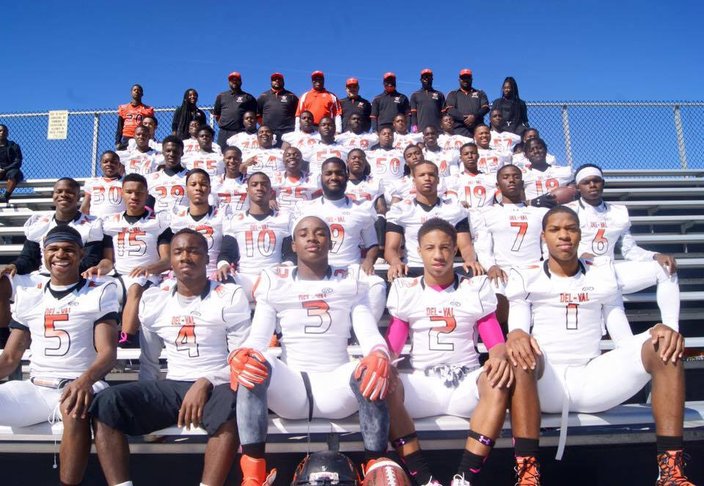
September 14, 2016
 Courtesy of Troy Gore/for PhillyVoice
Courtesy of Troy Gore/for PhillyVoice
Troy Gore, head coach of the Delaware Valley Charter High Warriors football team, worries that Public League players won't get the credit they deserve because of the shifting media landscape and fellow coaches who don't pay closer attention to record keeping.
This season was supposed to be the Philadelphia Public League high school football’s time to shine.
The Imhotep Panthers claiming the first-ever state championship for a “Pub” team last December brought quite a bit of attention Philly’s way, after all.
“By doing the amazing thing they did, they put the spotlight on the Public League. It tells the Public League that each and every program has to step up,” said Troy Gore, head coach of the Delaware Valley Charter High Warriors. “Those guys have the blueprint. Now, it’s time for each and every one of us to step up.”
While Gore could have been talking solely in a football sense before practice started in East Germantown on a recent afternoon – the Olney team has had to move practices several times because of neighborhood violence – his words focused on a convergence of media coverage, the digital divide, commitment, intra-division rivalries and journalistic budgetary constraints.
The type of issue that could go unnoticed by many, but is of the utmost importance to some, it boils down to this:
How can Public League coaches ensure their players get the attention they deserve if their accomplishments don't show up on the agate page?
That’s the conundrum Public League now faces.
The whole thing started when the 2016 Public League football season got underway in late August.
Through whisper-down-the-lane innuendos and Facebook-comment debates, Gore and others presumed that the Philadelphia Daily News had slashed its coverage of Public League sports. This was of particular concern because teams from the Catholic and Inter-AC leagues continued to get media attention, and the Daily News has long represented the local publication of record for the Public League.
That wasn’t exactly the case, but a major problem still remained.
The Imhotep Panthers celebrate their state championship at Hershey Park Stadium.
For decades on end, local writer Ted Silary was the guru of Public League coverage. (Gore said he remembers talking to him as a player nearly 30 years ago.) As Silary eased into retirement in recent years, his website continued to serve as the city’s Public League encyclopedia.
According to Gore, though, that site scaled back on coverage due to budgetary constraints afflicting much of the journalism world. Back in the day, there was money for stringers to cover games, send stats in and see that they got reflected in print. Not anymore.
When word filtered out about the shifting statistical processes, coaches and boosters within the other leagues banded together and “came up with a way to pay people to do their stats, but that option was never presented to the Pub,” said Gore.
"At first, the fight was against whoever did it. Once we started investigating, though, the fight became the mirror. It’s us.” – Troy Gore, head coach, Delaware Valley Charter High Warriors football team
That transition explains why Silary’s site now has regularly updated Catholic League and Inter-AC coverage, but only Public League archives.
Granted, the papers still feature high school football stories.
“We remain as committed as ever to high school sports, but some of [the concerns that we don't] might be coming from a shift from print to digital,” explained Pat McLoone, Daily News managing editor.
Still, Public League backers worry that statistics now won’t be readily available to draw college recruiters toward Public League players of note.
“The glory of a kid saying, ‘I led my team in rushing’ had always been backed up with proof since Ted had been doing that for years. He’s been a blessing. Having that statistical data on paper is proof,” Gore said. “I know from my dealings with Mr. Silary that if the Public League came together and said we have the means to provide our statistical data from each game, he’d allow it to be on the site.”
But talking about doing and actually doing are two different things.
“The problem is that the ‘Pub’ has to be fully committed. At first, the fight was against whoever did it to us. Once we started investigating, though, the fight became the mirror. It’s us that we're fighting against,” Gore said. “The Public League needs to step up just like the Catholic and Inter-AC, not only with this, but they have to step up with staying involved with their students all year round instead of just from August to November.”
And therein lies the challenge ahead.
A team photo of the 2015 Del-Val Warriors football team.
Gore is leading the charge, from a sideline-figure perspective, to encourage 28 active Public League programs to keep accurate statistical data from games in the early part of the season. That way, should the tides shift, they can compile them easily and come up with league leaders' lists for recruiting and competitive glory.
There’s also talk of incorporating websites and efforts including the Philadelphia Public League Sports Project (PPLSC) and raising money to hire stringers – even students – to cover the games and share information with Silary’s site and the papers.
When contacted, Silary steered PhillyVoice toward Eugene Pough, a Bartram High grad and co-founder of the PPLSC who’s serving as his point man to help make this happen.
Through that mentoring and youth development effort, Pough has already started reaching out to coaches via email and Facebook. So far, though, he's been filming games and practices while interviewing coaches as opposed to compiling statistical data.
"I'm not sure what other coaches are doing as far as compiling their stats, but I've been in touch with six or seven so far," said Pough. "The other coaches haven't responded to my Facebook messages."
So why is this such a big deal to coaches like Gore, and their players?
“When the stats aren’t kept, it hurts with recruiting. I can’t say, ‘This kid led the league in rushing, or passing, or sacks,’ if there aren’t resources to show a coach for proof,” he said. “It hurts the competitive edge of a kid that wants to have that kind of thing, it hurts getting votes for Public League players for all-city, the Big 33 or East/West Games. There’s proof for Catholic, Inter-AC and suburbs, but not the Pub now.
“It can be one of the reasons why a kid can’t get to the next level, doesn’t get that scholarship. Some scouts say they don’t take that into consideration, but they do. Think about the pro players, when they talk about their past: Dan Marino led the state in passing, Tony Dorsett led the state in rushing. It matters.”
While the coverage gap did come up when a guest speaker addressed the Del-Val team before its Sept. 3 game against the suburban Haverford School (that game got covered), Gore doesn’t think it’ll settle in for a few more weeks when kids will be able to pick up the paper and see other league’s leaderboard, but not their own.
“That’s when it’s gonna hit the fan,” he said, noting that many players already make their own highlight reels via the Hudl website, which helps ease the burden of coaches. “Then, it’s gonna be a ‘what about us?’ situation, but by then, if we don’t do anything now, it’ll be too late.”
“We’re very committed and happy to partner with anybody who will compile those stats.” – Pat McLoone, managing editor, Philadelphia Daily News
For his part, McLoone lauded reporters Aaron Carter, Rick O’Brien, Phil Anastasia and Mark Narducci, who cover most high-school sports regionally for the Daily News, Inquirer and Philly.com’s "Rally" page.
He noted that high school stories fare well when it comes to web story-sharing analytics, and that they cover as many games as they did in the Silary days. One recent week saw a pair of high school stories topped only by the Sam Bradford trade. (This weekend was no different, with stories about players on Woodrow Wilson High School in Camden garnering much media attention after players took a knee during the national anthem. That controversial storyline even followed Del Val north during its trip for a game in New York state.)
DelVal at the Syracuse Louisville game.. It's ORANGE OUT NIGHT, you know we had to be here..💯⚔🛡 pic.twitter.com/1I6P43cTnP
— Coach Troy Gore (@TroyKGore) September 9, 2016
When it comes to the statistical issue, McLoone also expressed a willingness to help.
“We’re very committed and happy to partner with anybody who will compile those stats,” he said.
Translation: The papers will help them get word of their Public League stats out, but they need the stats first.
The onus is on the programs to make that happen.
Gore said he’s already spoken to several coaches who are on board for the mission, though he worries about buy-in from the programs that Silary had trouble getting stats from in the past. (And no, he’s not naming names publicly.)
“We’re saying, ‘What can the Public League do for our kids?’ That’s the bottom line. Not what they can do. What can we do to make sure each high school program is effective and efficient enough to help our kids be recognized as the high-profile athletes they are?” Gore said.
“It’s time for us to stop being breastfed and do for ourselves," he continued. "That requires providing honest statistical data so they can be recognized nationally, statewide and locally. We’re in the midst of a situation where we can figure out how to make it work for the Pub if we do it ourselves. That’s what we need to do.”
Should all 28 programs get involved with season-long stats already being compiled accurately, it will be easy to share them with media outlets and online, he added.
“The days of Dad waking up and reading about his son in the Sunday paper are gone now, unless you’re in the Catholic or Inter-AC or Suburban or even in Jersey some places, but not the Pub,” he said. “It has to come together. We want it to happen, and we want it to happen for the entire Pub. If we can do our part, we can make it happen.”
 Brian Hickey/PhillyVoice
Brian Hickey/PhillyVoice Photo courtesy/Troy Gore
Photo courtesy/Troy Gore